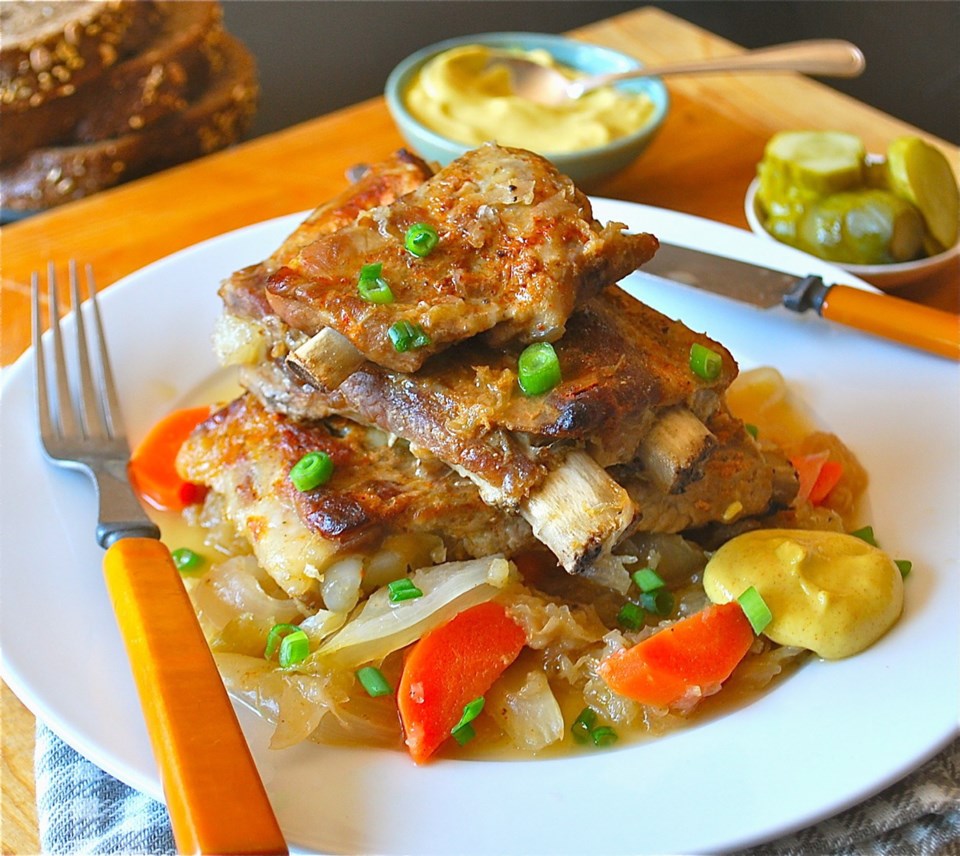When deciding what recipe to prepare for this week's Sunday Dinner column, I looked at the weather forecast and cheered. My joy was not caused by a prediction of more hot, dry and sunny weather ŌĆö just the opposite, in fact.
You see, IŌĆÖve been craving comfort food, beautiful braised things I donŌĆÖt typically prepare on warm days. So when I saw that Environment Canada was saying cooler temperatures and rain was on its way, I felt I had licence to prepare that style of dish.
I began my quest to make comfort food by heading to my corner butcher shop, hoping to find inspiration on what I should cook. I ended up leaving with pork side ribs and sauerkraut.
Those two foods always pair well, I thought, especially if you dress them up a bit.
On that note, before combining the ribs with the sauerkraut, after cutting them into smaller pieces, I gave them a richer colour by roasting and glazing them in a hot, 450 F oven with a honey/mustard mixture, flavoured with smoked paprika and sage.
While the ribs roasted 30 minutes, I combined the sauerkraut with a trio of vegetables and some bits of apple and spooned half of it into a deep casserole. The roasted and glazed ribs were then set on top of the sauerkraut mixture in the casserole.
I then spooned the rest of the sauerkraut mixture over the ribs. In went some stock, the casserole was covered, and then the ribs were cooked two plus hours in a lower 300 F oven.
When cooked, the ribs, braised by the stock, were succulent and tender and richly flavoured by the sauerkraut and other items in the casserole.
This was definitely the type of comfort food I had been craving. If you desire it, too, you could further enhance this hearty casserole of ribs and sauerkraut by serving it with such things as pickles, boiled potatoes, rye bread and some more Dijon mustard to dollop on the plate.
Honey Mustard Ribs baked with Sauerkraut
Pork ribs, first roasted and glazed with a honey/mustard mixture. When nicely coloured, the ribs are set in a casserole with sauerkraut, vegetables, apples and stock, covered, and then baked until very tender and delicious.
Preparation time: 30 minutes
Cooking time: two hours 45 minutes
Makes: four servings
1.75 kg pork side ribs, or 2 large, full racks pork back ribs
1/4 cup Dijon mustard
2 Tbsp honey
1/2 tsp smoked paprika
1/2 tsp ground sage
ŌĆó salt and freshly ground black pepper, to taste
1 (750 mL) jar sauerkraut, lightly rinsed, and then drained well (about 3 cups; see Note)
1 medium onion, halved and sliced
1 large celery rib, halved lengthwise and sliced
1 large carrot, halved lengthwise and sliced
1 medium to large red apple, cored and cut into 1/2-inch cubes
2 1/2 cups chicken stock (see EricŌĆÖs options)
1 Tbsp chopped fresh parsley, or 2 green onions, thinly sliced
Preheat oven to 450 F. Line a large sided baking sheet with parchment paper.
Cut the ribs between the bones into two-rib pieces. Set the ribs in a single layer on the baking sheet, meaty-side-up.
Combine the mustard, honey, paprika and sage in a small bowl. Brush this mixture on top of the ribs. Season the ribs with salt and pepper. Roast the ribs, uncovered, in the middle of the oven for 30 minutes.
While the ribs roast, place the sauerkraut, onion, celery, carrot and apple in large bowl and mix to combine. Set half of the sauerkraut mixture into a large and deep casserole. (My casserole was 13x9-inches in length and width, and three-inches tall. A large Dutch oven could also be used for this recipe.)
When the ribs have roasted 30 minutes, remove from the oven. Lower the oven temperature to 300 F. Set the ribs in an over-lapping layer on top of the sauerkraut in the casserole. Spoon the remaining sauerkraut mixture in the bowl over the ribs.
Now pour in the stock.
Cover and cook the ribs in the oven for two hours and 15 minutes, or until the ribs are very tender. When plated, sprinkle the ribs and sauerkraut mixture with parsley or green onion, and serve.
Note: Sauerkraut is sold in cans and jars that vary in size. If you cannot find one that is 750 mL, simply use one that is close to that in volume.
EricŌĆÖs options: If desired, you could replace all or half of the stock with beer, such as a pilsner or lager.
Eric Akis is the author of eight cookbooks, including seven in his Everyone Can Cook series. His columns appear in the Life section Wednesday and Sunday.



